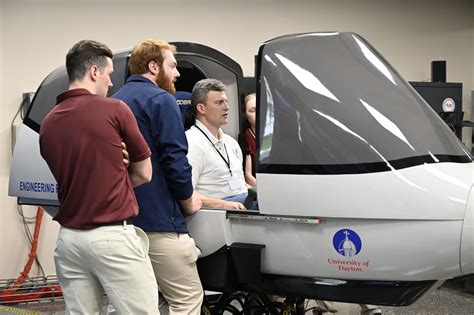Mississippi State University’s Department of Aerospace Engineering is a renowned center of innovation, research, and education in the aerospace domain. Its faculty members are pioneers in their fields, with expertise in disciplines ranging from aerodynamics and propulsion to spacecraft design and remote sensing.

Educational Excellence for Aspiring Aerospace Engineers
Mississippi State offers a comprehensive undergraduate aerospace engineering program, accredited by the Accreditation Board for Engineering and Technology (ABET). Students engage in coursework that covers fundamental principles of aerospace engineering and apply their knowledge in hands-on design projects. The program culminates in a capstone project, where students demonstrate their ability to solve real-world engineering challenges.
For students pursuing advanced degrees, Mississippi State offers both Master’s and Ph.D. programs in aerospace engineering. These programs provide students with the specialized knowledge and research skills necessary to excel in their chosen fields. Graduates of the aerospace engineering department are highly sought after by leading aerospace companies and research institutions.
Research that Pushes the Boundaries of Aerospace
Mississippi State’s aerospace engineering faculty are actively engaged in cutting-edge research that is shaping the future of space exploration. The department has received over $100 million in external research funding in the past five years, supporting projects in areas such as:
- Hypersonic Propulsion: Developing novel engine technologies that enable hypersonic flight for advanced military and commercial applications.
- Space Systems Design: Designing and optimizing complex space systems, including satellites, spacecraft, and launch vehicles.
- Remote Sensing: Using satellites and other remote sensing technologies to monitor Earth’s environment, resources, and natural hazards.
- Unmanned Aerial Systems (UAS): Developing autonomous drones for a wide range of civilian and military applications.
Mississippi State’s research facilities provide students with access to state-of-the-art equipment and technologies. The High-Performance Computing Center offers unparalleled computational power for simulations and modeling. The Propulsive Fluids Laboratory enables students to conduct experiments on advanced rocket propulsion systems.
Inspiring the Next Generation of Aerospace Leaders
The Mississippi State aerospace engineering department is committed to inspiring the next generation of aerospace leaders. The department offers outreach programs that engage K-12 students in STEM education. The annual Mississippi Aerospace Scholars Program brings high school students to campus for hands-on experiences in aerospace engineering.
The department also hosts industry-sponsored design competitions that challenge students to solve real-world engineering problems. These competitions provide students with valuable experience and prepare them for success in the aerospace industry.
Six Strategies for Success in Aerospace Engineering
- Pursue a strong foundation in mathematics and science. Proficiency in calculus, physics, and chemistry is essential for success in aerospace engineering.
- Develop problem-solving skills. Aerospace engineers must be able to identify and solve complex engineering problems.
- Gain practical experience. Internships and hands-on projects provide valuable insights into the aerospace industry.
- Network with industry professionals. Attend industry conferences and events to connect with potential employers.
- Stay up-to-date with the latest technology. The aerospace industry is constantly evolving, and it’s important to keep abreast of emerging technologies.
- Be passionate about space exploration. Aerospace engineering is a demanding field, but it’s also incredibly rewarding.
Why Choose Mississippi State for Aerospace Engineering?
- Nationally Renowned Program: Mississippi State’s aerospace engineering program is consistently ranked among the top in the nation by U.S. News & World Report.
- Expert Faculty: The department’s faculty members are internationally recognized experts in their fields.
- State-of-the-Art Facilities: Students have access to cutting-edge laboratories and research facilities.
- Research Opportunities: Mississippi State offers exceptional opportunities for undergraduate and graduate students to participate in research.
- Industry Connections: The department has strong relationships with leading aerospace companies and organizations.
Benefits of a Career in Aerospace Engineering
- High Demand: Aerospace engineers are in high demand due to the growing need for space exploration, national defense, and commercial air travel.
- Competitive Salaries: Aerospace engineers earn some of the highest salaries in the engineering field.
- Career Advancement Opportunities: With experience and education, aerospace engineers can advance to leadership positions in management, research, and development.
- Global Impact: Aerospace engineers work on projects that have a global impact, advancing space exploration and improving the lives of people around the world.
- Intellectual Stimulation: Aerospace engineering is a challenging and rewarding field that constantly pushes the boundaries of human ingenuity.
Frequently Asked Questions
- What are the career opportunities for aerospace engineers? Aerospace engineers work in a variety of industries, including aerospace manufacturing, government agencies, research institutions, and defense contractors. They design, build, test, and operate aircraft, spacecraft, and other aerospace systems.
- How competitive is the aerospace engineering job market? The aerospace engineering job market is highly competitive, but there is a constant demand for qualified engineers.
- What are the salary expectations for aerospace engineers? According to the U.S. Bureau of Labor Statistics, the median annual salary for aerospace engineers is over $100,000.
- What is the work environment like for aerospace engineers? Aerospace engineers typically work in offices and laboratories, but they may also be required to travel for field tests or project meetings.
- Can I work part-time or remotely as an aerospace engineer? Part-time and remote work arrangements are becoming more common in the aerospace engineering field, but they are not always available.
- What is the future of aerospace engineering? The future of aerospace engineering is bright, with increasing demand for engineers who can develop and operate next-generation aerospace systems.
- What are the most important skills for aerospace engineers? The most important skills for aerospace engineers include problem-solving, analytical thinking, communication, and teamwork.
- What are the common career paths for aerospace engineers? Common career paths for aerospace engineers include design engineer, systems engineer, test engineer, and project manager.
